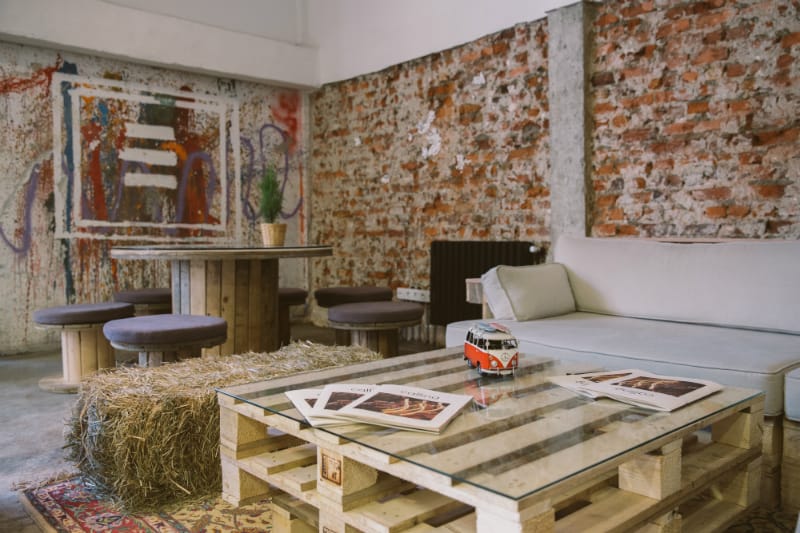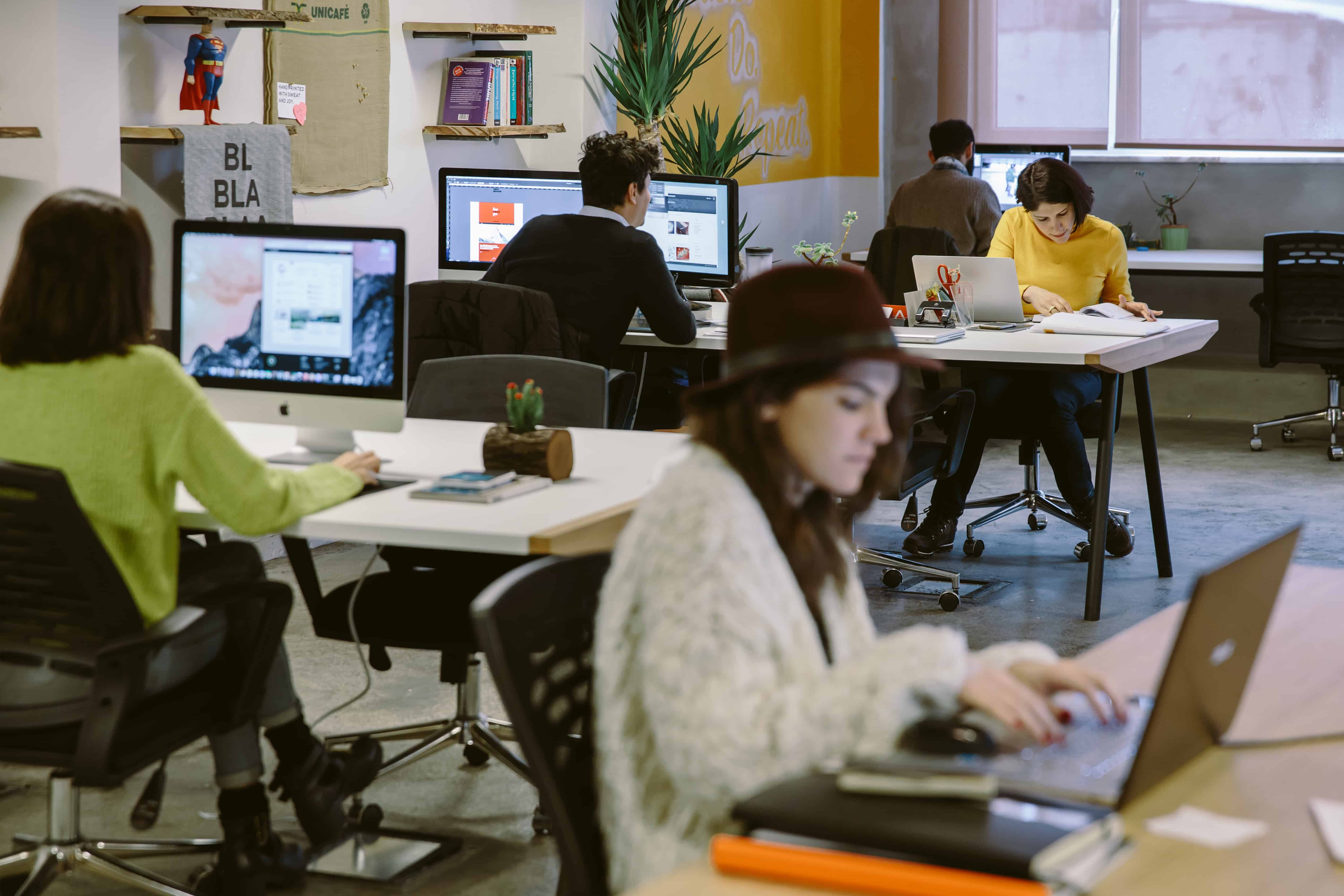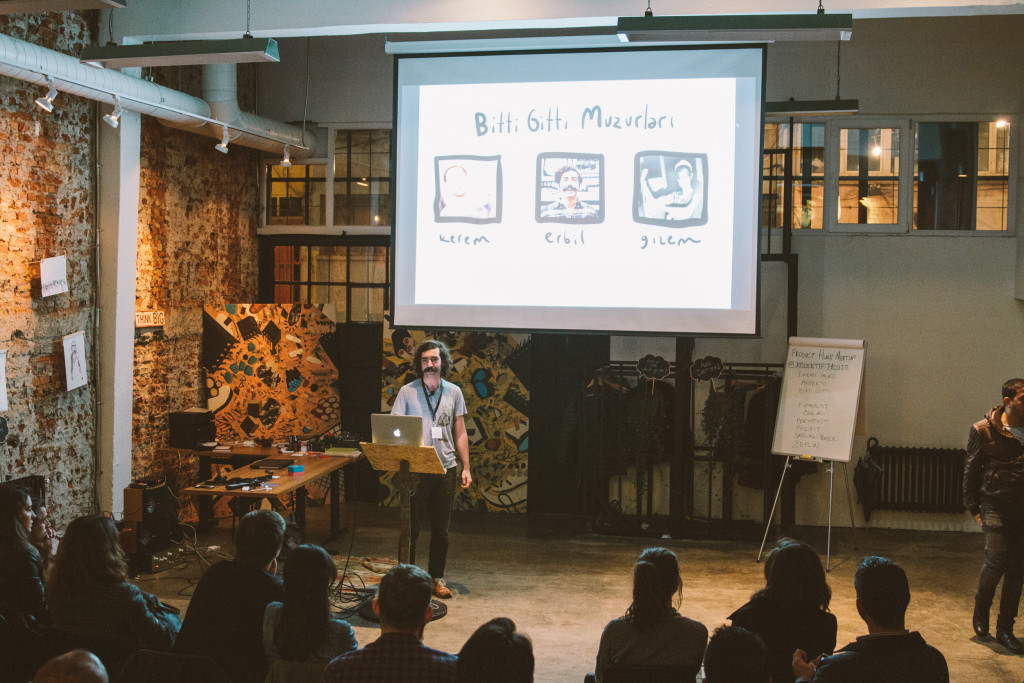Kolektif House, the city’s latest arrival in co-working spaces, has embarked on a quest to transform how we view shared work environments. Tucked away in the uncharted territory of Sanayi, the enormous multistory space is rapidly gaining a reputation as an outside-the-box destination for creatives and freelancers of all fields. In addition to the traditional approach of renting out offices and individual work spaces, Kolektif House is host to brunches, concerts, lectures, film screenings, yoga sessions, art exhibitions, networking meetups, cocktail parties, and more. Borrowing from and building on their ever-increasing network of participants, the space is beginning to come to life.
We recently had the opportunity to speak with one of Kolektif House’s three co-founders, Ahmet Onur, about the project and what we can come to expect.

Thanks for taking the time to chat. Could you just start off by telling us a little bit about yourself?
Well, my name is Ahmet. I’m originally Turkish but lived most of my life abroad. I was born in LA, lived a little bit in Turkey, and then attended high school in Switzerland. I lived in Boston for college and then worked two years in Africa selling cables and doing some corporate work. I am a finance and entrepreneurship guy, that’s what I studied. Afterwards, I had a little turn from the corporate world into yoga in India and Mexico. I got involved in permaculture communities, self-sustainable living and relatively green, more spiritual ways of looking at things. That is kind of where I stand now. After that, I came to Turkey to start Kolektif House.
Could you tell us a bit about Kolektif House as a project?
We are three partners. That’s kind of the most important part of the story. One of my partners is one of my oldest friends. After traveling in India and Mexico and pulling the plug for a while, I wanted to come back to Istanbul, to a capitalist setting, with an inspiring project that has a purpose. The goal was definitely to maintain the energy or mindset of what I’ve seen in those remote places, more humane you could say. Meanwhile, my partners were living in California. One of them, Arda Orhan, was working in Bosch Multimedia doing research. He is a computer scientist. The other, Civan Orhan, was just finishing up a UCLA Master’s in real estate. He was preparing for consulting. At the same time as all this, they were building an app for the Turkish stock exchange. It’s an app that lets you follow your investments in one single page on your phone. You can see daily your profits, losses, how your portfolio performed, and so forth.
I had come to Turkey, and they called me one day and said we want to come back as well. They were going to launch their app and knew they had to be here for that. They didn’t want to come back from California for many reasons: the vibe, the energy, the lifestyle there. Istanbul is a really metropolitan city. I still didn’t know what to do, so I told them we should look for a creative space that we can all stay in — we could jump under the same roof, instead of each of us renting offices alone. We’d jump in and contact other friends of ours and get some creative people together. We could create a work environment that’s suitable. Then we followed the concept of co-working, which existed already. So what is it? Under one roof, you’re gathering… the business itself is just splitting up big real estate into small offices. That’s kind of the boring side which has existed for a while.
Now what is happening and what we try to do is that we filter creative people. We said, “Let’s go big.” Sanayi was a big game-changer for us, because the real estate value here allowed us to go really big in meters squared. We decided we’d only host creatives, to create the most inspiring space for creators. Words, sentences, ideas… it should speed up the process of the blossoming of each creator. Then we ended on “Love. Create. Inspire.” as our three-pillar philosophy. I can summarize the thought process behind it, as they’re the three words we always go back to. People often ask and we say that anybody with the intention to love, if they have the urge to create and then inspire others by sharing what they create… that is the mindset of Kolektif House.

What sets Istanbul apart for a project like this? Why here?
To look at it from a business perspective, Istanbul is still really raw. It’s lacking innovation and the creative industries are just piercing the veil. The general trend in the US has already changed towards open-space working. No more suits… companies are kind of leaping into a more open work environment. The creative industries are booming for entrepreneurs, artists, the freelancer movement and boutique companies. Shortly before that, it was all agencies or companies of 150 to 200 people charging ridiculous numbers to bigger companies that didn’t care. Now people understand that you can have the same quality of work with the freelancer mentality. You cut the costs and it’s more efficient. This allowed people in big cities especially to take the lead in this change. We thought Istanbul was just at the breaking point of this change. The same could be said for Cape Town or Rio. All these cities share one common thing in that they follow the trend just a few steps behind. We thought it was the perfect timing to come and create this platform. We thought it would be really beneficial for everyone.
Sanayi is definitely a unique place for such a platform. Why this neighborhood specifically?
Wow. I didn’t even know that Sanayi existed. In the ten years I had lived here, I never even stepped foot here. Then I saw that Karaköy, Cihangir, Galata… the first locations you would think for creative stuff in Istanbul, had changed in terms of pricing to accommodate touristic spaces. Meters squared prices in Karaköy will not allow creativity to blossom anymore. You are paying ridiculous numbers and creativity needs that space. That low economic burden to get somewhere… Sanayi was maybe five to seven times cheaper than Karaköy. That’s the most obvious reason.
The latter is that Sanayi actually is home to many creators. The authentic ones. The ones willing to take that one step out of the ordinary to create. We’re 150 meters away from Büyükdere Caddesi, one metro stop from Maslak and the same for 4 Levent, which are probably the prime locations of Istanbul’s financial centers. So actually, Sanayi for us was a forgotten production zone for creatives. They somehow missed it under the magnifying glass. So for us, it was half-planned, half-intuitive.
This was originally an old textile factory. It was burnt down. It was really a wreck. We looked at it and decided we need the space, so we’d somehow give life to it.
So far, what has been the biggest challenge in moving this project forward?
The biggest challenge was actually Sanayi. It was Kolektif House’s biggest gamble in moving here. We’re the only ones bringing so many people out of the ordinary. We weren’t sure we could pull it off — it was the highest risk. Since then, we’ve seen that there are still people who become confused and lost, asking why we’d open here, without knowing we’re the managers. They’ll ask why we opened the place or why we’re there, and we know they’re the people that are not suited for Kolektif House. We’ve seen that the big challenge has become a filter, that helped us attract the right people. They come in and are wowed. They think it’s a bold move.
Once again, creativity for me personally and for our team, requires that one step. Creating something is 0 to 1. That means you have to do something that isn’t done. It’s not taking 1 into 5. So that’s working out pretty well. To manage that perception was our biggest challenge. We could have been really frightened and lost track of that and become demoralized. We stayed patient and waited for the few that understand our goal.

In the same vein, what has been the biggest surprise?
I think the biggest surprise is the content we’ve generated here. Look at our community. If you look one by one at who is at Kolektif House right now, it’s ridiculously surprising. We had a dream that everybody would be from a different field. Our biggest goal here is ramping up the positive synergies between these freelancers and boutique companies within the building. For that to happen, we had to have a good mix. Now if you look at our office floor, which is full now, we have an architect, interior designer, graphic designer, ad agency, art gallery, technology consultancy, incubator, tech start-ups, career coaches, social entrepreneur who is giving consultancy to African entrepreneurs and so forth. We don’t have two people from the same field so far, which is kind of surprising. Even if we wanted, we couldn’t have done that.
How is the synergy working out between all of them?
It’s going great. That also surprised us. Our graphic designer already branded three other companies within the building for free. So that is something you can’t get anywhere. You move here and suddenly you have everything about creativity you can benefit from. If you ask a photographer, he comes and takes a professional picture for you. These are all services that would charge 500 – 1,000 USD outside. Now what happens at Kolektif House is that suddenly we’re seeing these things. At this point, we’re a family within, where we don’t think of gains. We don’t think of money. We think only of cost or solutions. We are motivating each other to get that financial strength from the outside.
Be sure to check out Kolektif House and stay tuned for part 2, coming tomorrow!










[…] Tarik Yassien continues his conversation with Kolektif House co-founder, Ahmet Onur, on what we can expect from the group. You can read Part 1 here. […]
Very good